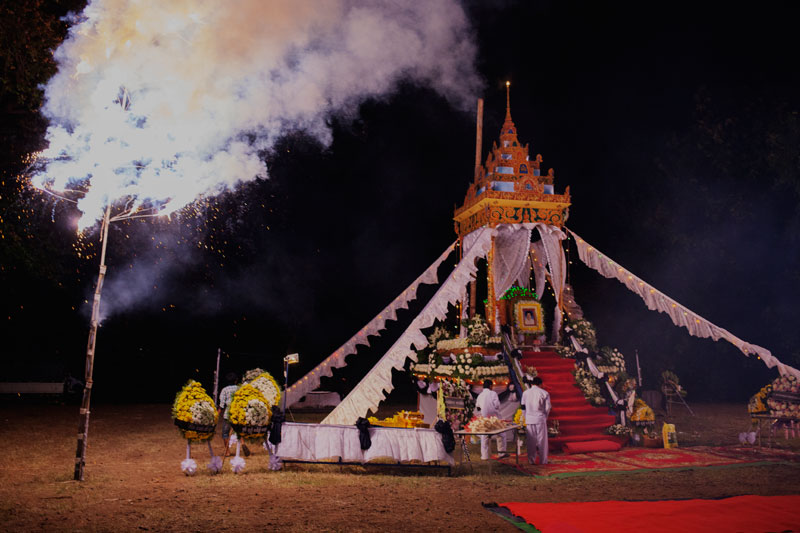PAILIN PROVINCE – Family and friends of former Khmer Rouge Social Affairs Minister Ieng Thirith bid farewell to the indicted criminal Monday night at her home near the Thai border in this tiny province still governed by the regime’s remaining loyalists.
Declared unfit to stand trial for crimes against humanity by the Khmer Rouge tribunal in 2012, Ieng Thirith in her final decades enjoyed the kind of careful medical treatment in Thailand that her revolutionary regime denied to regular Cambodians, before succumbing to illnesses at the age of 83 on Saturday.

Those close to the former Khmer Rouge minister, who had been married to the regime’s former Foreign Minister Ieng Sary until he died in 2013, began gathering in the morning at the home of the couple’s only son, deputy provincial governor Ieng Vuth.
Mourners arrived and departed throughout the day to pay their respects to Ieng Thirith inside Mr. Vuth’s modern white villa, but most arrived at about 4 p.m. to feast on steaming platters of grilled fish served under three large tents in his tiled yard.
Ieng Sophy, the 58-year-old second daughter of Ieng Thirith, said her teenage memories of her mother as the only senior female official of the disciplinarian government were of love but separation.
“She was a very warm person. She was emotional with her children, and she loved them very much. She took care of us, and I never saw her hit any of her children; she always just explained things and educated us,” Ms. Sophy said.
“We would only see her at meetings and during the plenary sessions. It was not the very best. We had to follow strict discipline just like everyone else. We could not share everything like this. Now we have more, so we can enjoy,” she said.
Ms. Sophy, who completed her master’s degree in economics at the City University of New York while her father represented Cambodia at the U.N. in the 1980s, claimed that her family had been unaware of the mass killings during the Pol Pot years.
“I never saw that, them taking live people away. We lived in one place behind closed doors,” she said. “Some things were right, and some things were wrong. They could not control all of the country.”
Walking through a gate in front of Mr. Vuth’s house, Koeut Sothea, who last year took over as provincial governor from Y Chhien, Pol Pot’s former bodyguard, said that Ieng Thirith remained widely respected in Pailin.
“I respect her as an elder and as a professor. She did a number of good things,” he said, before appearing to dismiss the Khmer Rouge’s atrocities. “It was [due to] political developments and the internal problems of the Khmer.”
At about 6 p.m., with the sun sinking toward the horizon, Mr. Vuth, who declined to speak to reporters, led a procession carrying his mother’s coffin from his own home to his parents’ old wooden house across the street.
Military police dressed in white placed the coffin into an immaculate golden funeral pyre set on the home’s expansive grounds. The procession, which included two SUVs, circled the pyre three times before the coffin was put inside.
After a half-hour lecture from a monk on how to live well, Ieng Thirith’s first daughter, Huon Vanny, rose to deliver the eulogy to the 400-odd people who had settled on chairs under tents as the sun set.
“The sun rose, sending its powerful light over the earth, but that time passed and the powerful light faded away into the twilight. If we compare that with human beings, anyone in any walk of life always fades away in the final minutes,” she said.
“Mother dared to sacrifice everything, and she especially sacrificed the immortal sentimental ties between mother and child, which is a great act of bravery that few people reach,” Ms. Vanny said.
“Even though father and mother never took care of us closely, their pity and love remained with the children forever,” she said. “We have a strong belief that both father and mother loved peace, fairness and had true patriotic ideals.”
Ms. Vanny ended her eulogy by reading an unfinished poem about Cambodia that Ieng Thirith wrote in her final years.
“Khmer children, euy. Oh, Khmer children, euy, please do not forget your background. Cambodia is built up wonderfully, and is called the golden land,” she read.
“Our land is huge, rich in rivers both small and large, and fresh produce is abundant; rice, vegetables and fruit trees, we have plenty, and never beg. We only export overseas.”
“And the mountains are gigantic, stretching far away; the forests and the furniture are invaluable, and there are also medicinal herbs,” she finished, noting that the poem was never finished due to her mother’s arrest for crimes against humanity.
“Please, mother’s spirit, go to find peace,” she said.
Mr. Sothea, the governor, then lit a large fuse, causing four wooden towers around the pyre to burst into flames and light the pyre. With fireworks exploding overhead, a two-day funeral process ended, and Ieng Thirith’s coffin was burned.